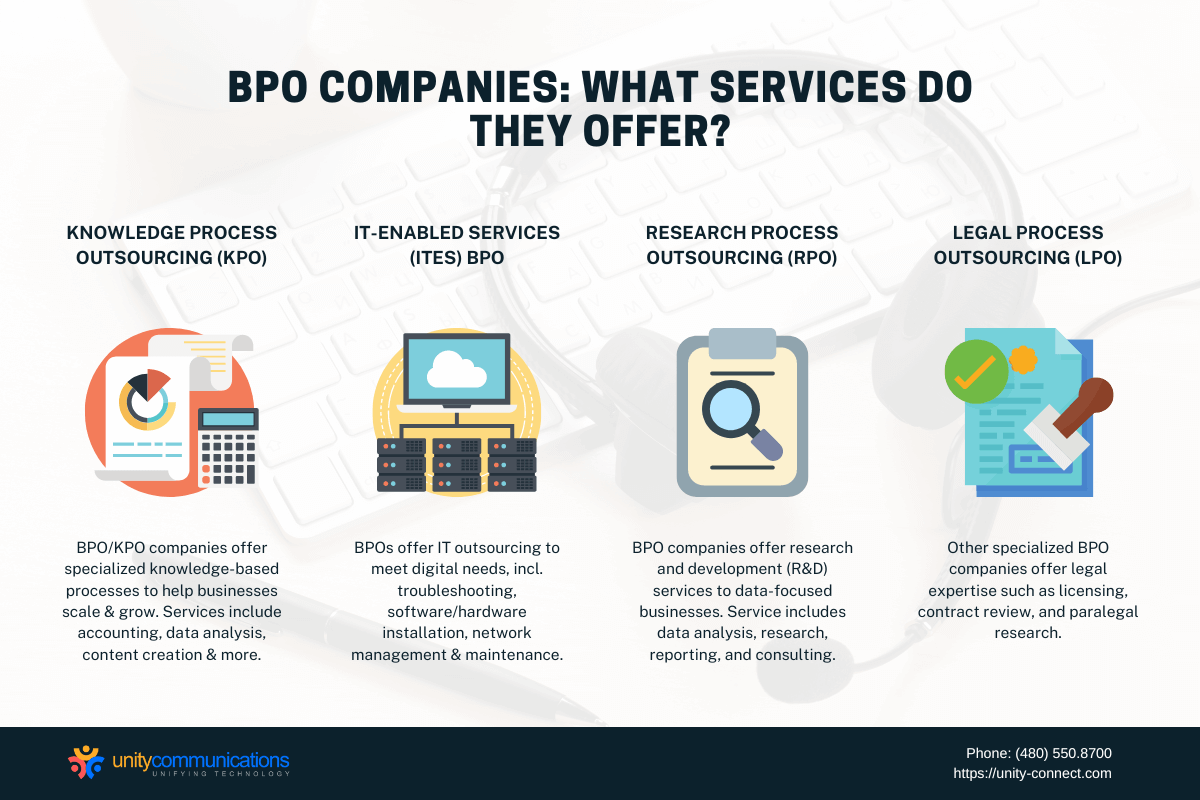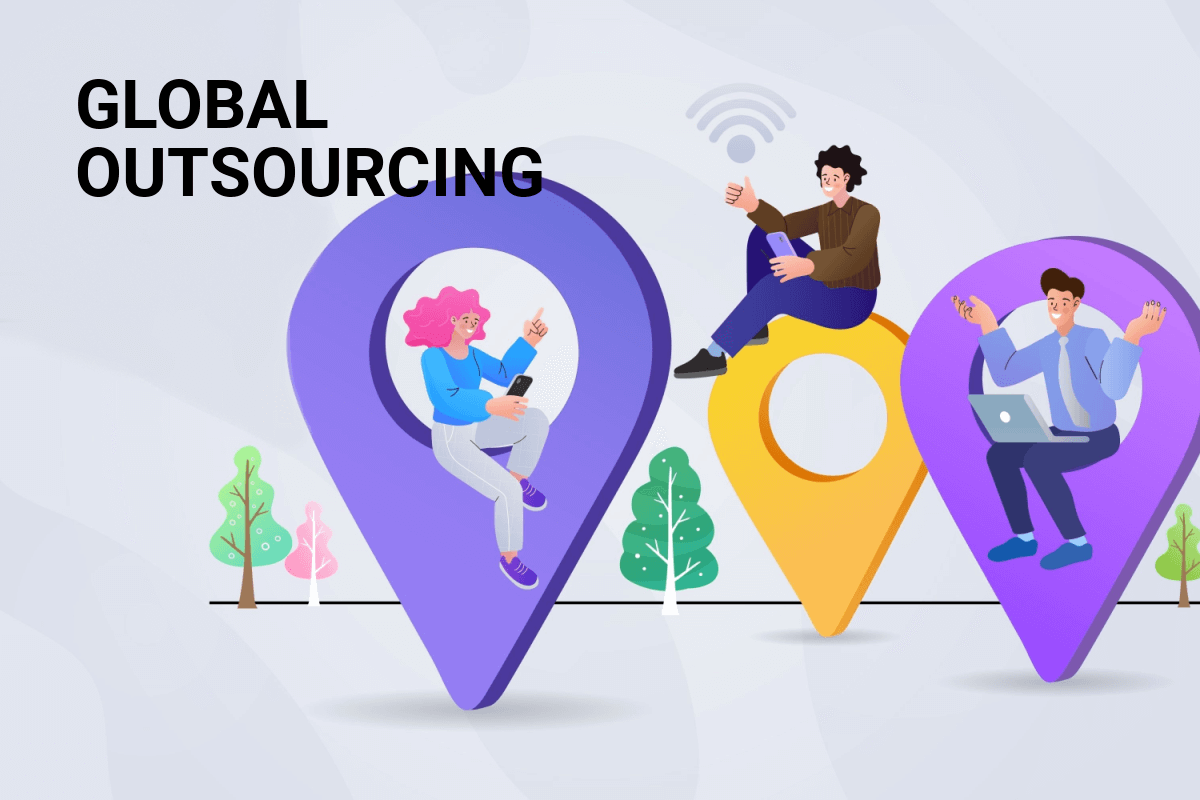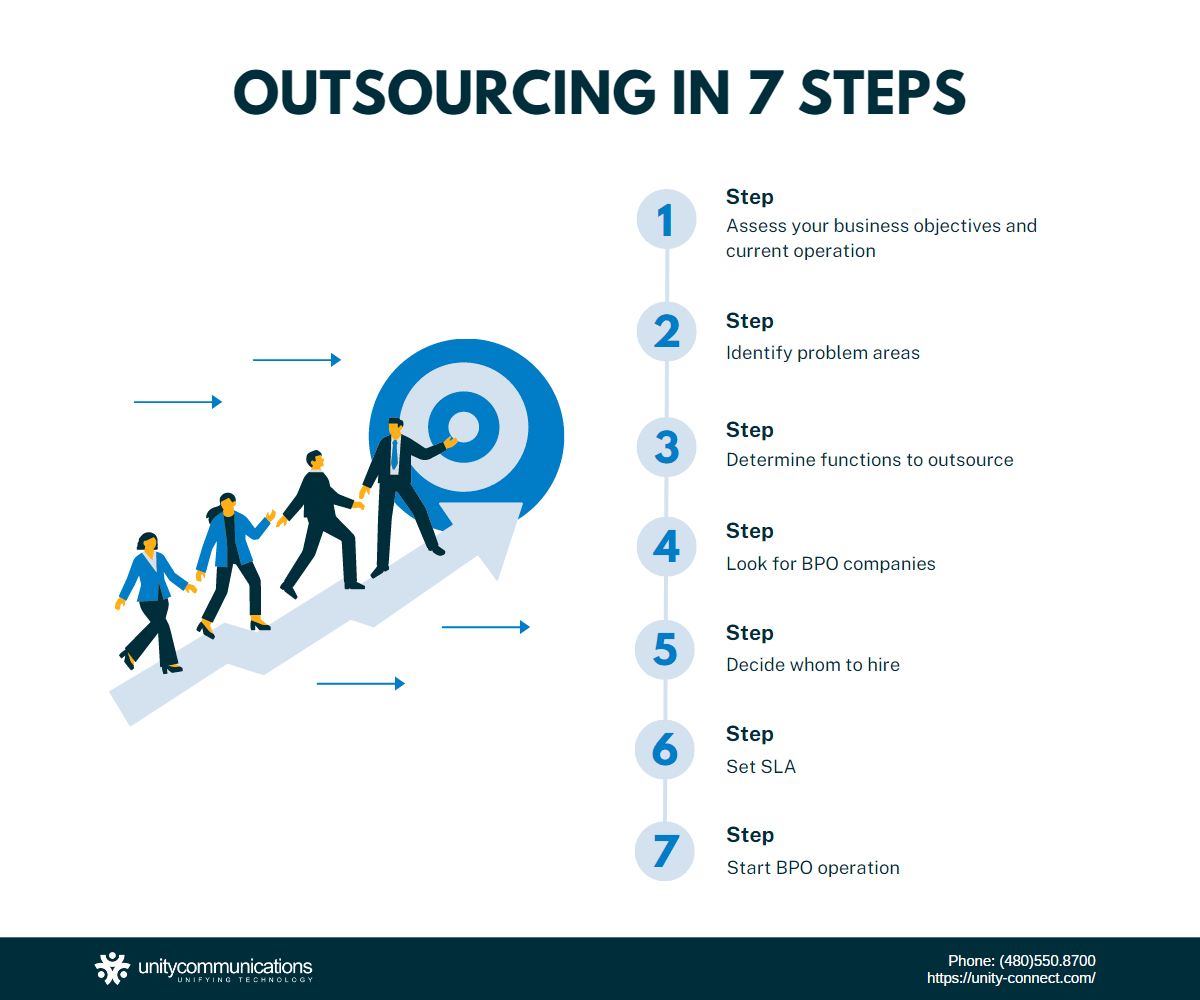Table of Contents
Do you lack staffing, technology, and tech or IT resources for your business? Instead of building an in-house team from scratch to address what you need but don’t have, why not consider outsourcing these services instead?
Hiring a business process outsourcing (BPO) provider comes with several advantages. But what exactly is its role in your company?
This page uncovers the purpose and meaning of a BPO company. Read on to learn everything from services to the types and benefits of outsourcing.
BPO Company: What is It and What Does It Do?

To understand a BPO company, let’s define what business process outsourcing is.
Business process outsourcing is when a company, like yours, hires an external provider to furnish certain services your company needs rather than establishing an in-house department or departments to do the tasks. For example, this external service provider might handle certain front-office or back-end operations of you, its client. Your company has outsourced some to a third-party provider of some of those operations. That’s BPO in a nutshell. But let’s look at further examples.
Take an e-commerce business. Any retail operation needs a large workforce to serve a growing clientele, and this is especially true for e-commerce businesses, where all transactions are online, and no brick-and-mortar stores exist to serve customers. An e-commerce business might hire a BPO company to do its customer service tasks. Another example? IT support. A software development company might hire a BPO company to provide level 1 or 2 support to its customers for IT issues with its software.
The BPO industry has grown exponentially. Today, it has become a viable solution for optimizing operations and scaling businesses.
BPO Companies: What Types of BPO Companies Exist?
The three primary types of outsourcing are defined by the distance between clients and their outsourcing partners. Most BPO companies can serve businesses within or outside their nation’s borders. In other words, a BPO company may be onshore, nearshore, or offshore. Here’s what these terms mean:
Onshore BPO Company
Onshoring means that a third-party service provider works with a business in the same country. Suppose a U.S. e-commerce store hires a shipping company. As the e-commerce store serves only customers within the U.S., a third-party provider based in the same country is the most effective choice to deliver products to their customers.
According to Clutch, nine out of 10 small businesses plan to outsource this year. About 33% of those businesses want to access flexible resources, while 26% want to work with experts. Hiring an onshore BPO company is best if you lack an expert workforce or advanced technology.
Nearshore BPO Company
Nearshoring is when a third-party service provider works with a business in a nearby country. In this type of outsourcing, a BPO company usually handles its clients’ customer-facing support tasks.
For example, U.S. banks often transact with a diverse range of customers, including Spanish or French speakers. To better serve clients of all cultures, banks outsource their bilingual customer service to a BPO company in Mexico or Canada. This company has a team of representatives who can speak English and other major languages.
Businesses outsource to nearshore BPO companies due to their lower cost, geographical proximity, and cultural familiarity. The same Clutch report cited that 21% of small businesses plan to hire a nearshore company.
Offshore BPO Company
Lastly, offshoring involves businesses working with third-party service providers in a nation relatively distant from the client. The most popular example of offshoring is when companies outsource information technology (IT) support and call centers to BPO partners in Asian countries.
According to Deloitte, cost reduction is the top reason to outsource. Hiring offshore BPO companies is the best way to reduce operating costs without sacrificing service quality.
BPO Companies: What Services Do They Offer?
 To dig deeper into how BPO companies function, let’s expand on the services they offer.
To dig deeper into how BPO companies function, let’s expand on the services they offer.
Knowledge Process Outsourcing (KPO)
A BPO company primarily offers specialized knowledge and skills. It has the industry experience and expertise to handle and improve knowledge-based processes. Thus, the professional team essentially helps you scale and grow your business.
Some business functions offered by KPO providers include:
- Accounting and bookkeeping
- Data entry and analysis
- Content creation
- Design and animation
- Market research
IT-enabled Services (ITES) BPO
Every business has digital needs. Thus, BPO companies offer IT support outsourcing services to meet the market demand. These functions include:
- Troubleshooting
- Hardware deployment
- Software installation
- System updates and maintenance
- Network management
The IT sector comprises the largest segment of the BPO industry. According to Statista, its global revenue might grow from $395 billion this year to $587.3 billion by 2027 at a compound annual growth rate (CAGR) of 8.26%.
Research Process Outsourcing (RPO)
Data-focused businesses hire BPO companies to provide research and development (R&D) services, especially in the investment and marketing industries. Specifically, RPO companies handle:
- Data analysis
- Investment research
- Business reporting
- Business Consulting
Most organizations rely heavily on big data. The global market for big data might grow from $162.6 billion in 2021 to $273.4 billion by 2026 at an 11% CAGR. Many companies will employ RPO to ensure data acquisition, accuracy, and protection.
Legal Process Outsourcing (LPO)
Some BPO companies have specialists with educational backgrounds and expertise in law. These BPO companies handle the legal functions of a business. LPO offers outsourcing services such as:
- Business licensing
- Contract review
- Intellectual property (IP) management
- Paralegal research
BPO Companies: What Business Functions Do They Handle?
Earlier, we covered general types of outsourcing services. But as a growing business strategy, outsourcing covers both front-office and back-end tasks. To delve deeper into what BPO companies do, let’s discuss each business function.
Front Office
The front office refers to customer-facing tasks. BPO agents interact directly with your customers via phone calls, email, or live chat. Some commonly outsourced front-office tasks include:
| Customer-facing Tasks |
| Customer service usually gets outsourced to a call or contact center. It involves assisting customers via different communication channels: phone calls, email, or live chat. BPO agents answer customer inquiries, process order requests, provide updates, and handle complaints. |
| Sales or telemarketing aims to promote a business and sell its products or services. BPO telemarketers place calls to reach potential customers. Sales representatives also perform cold email outreach for the same purpose. |
| Technical support offers technical assistance to end users of technology. BPO agents help customers resolve problems with mobile phones and other electronic devices. Tech support also assists your employees when they encounter computer and web issues. |
Back Office
In contrast, the back office is not customer-facing. BPO agents handle either customer support or administrative tasks such as:
Customer-support Tasks (BPO agents support front-office employees who work with customers directly.) | Administrative Tasks (BPO providers handle functions critical to business operations.) |
| Data entry involves encoding data into digital format. It deals with fundamental customer and business information. BPO agents record, secure, and analyze data. | Finance and accounting manage a company’s finances and maintain its cash flow. Outsourcing finance and accounting is common among small businesses. |
| Order fulfillment entails processing orders placed by customers. BPO specialists receive order requests, process payments, and ensure products get delivered to customers. | Human resources (HR) manages employees within an organization. It includes recruitment, onboarding, training, and long-term retention of skilled employees. |
| Inventory management tracks the procurement, storage, production, and sales of products. Back-end BPO departments handle this for e-commerce and retail stores. | IT support provides technical assistance. It involves troubleshooting software and hardware, system updates, and maintenance. |
BPO Companies: Top Industries They Cater To
According to Grand View Research, the global BPO market might grow from almost $246 billion in 2021 to $525.2 billion by 2030. It is projected to expand with a 9% CAGR during the forecasted period. The following factors drive its market growth:
- Improving service efficiency
- Ensuring business agility
- Reducing operating costs
- Focusing on core competencies
The Grand View Research report identified the top industries handled by BPO companies. Let’s discuss these various sectors to further explain what a BPO company is.
1. IT and Telecommunications
Today, an IT department is a prerequisite in business. Companies must either establish an IT department or optimize their current tech stack. Telecommunications is also an integral factor when interacting with various stakeholders. That’s why many firms work with telcos.
Outsourcing has become a viable solution for the IT and telecommunications industries. In fact, this segment had the largest revenue share in 2021 (almost 35%). Companies outsource to ensure internet connectivity, reduce security risks, and leverage advanced technologies.
Here’s how a company in the IT and telecommunications industry employs outsourcing: The International Business Machines (IBM) Corporation is a giant tech company operating globally. It’s one of the biggest employers worldwide, outsourcing about 70% of its workforce. It outsources business processes such as IT support, network management, and infrastructure setup. |
2. BFSI
BFSI stands for banking, financial services, and insurance. Financial organizations have a long history of outsourcing. They outsource customer service, billing and collections, and back-office functions. This segment has long considered BPO feasible for cost-efficiency.
According to the Grand View Research report, the BFSI segment might have the fastest growth at a 9% CAGR. These companies plan to outsource several processes, including asset and investment management. They seek to achieve effective customer service.
Here’s how a company in the BFSI industry employs outsourcing: American Express (Amex) is a financial organization operating globally. It primarily provides banking services, from checking accounts to savings accounts. But it also offers non-card services such as financial consulting. It is one of the pioneers in establishing back-end facilities and outsourcing front-office functions. |
3. Healthcare
The healthcare sector has recently started relying on the BPO industry. Hospitals usually outsource non-clinical tasks such as medical billing and claims processing. But they have also started outsourcing clinical tasks such as direct patient care.
The global healthcare outsourcing market is expected to grow from $270 billion in 2020 to $736.47 billion by 2030. The pandemic accelerated this market growth and paved the way for the rise of outsourced telehealth, such as remote patient monitoring (RPM).
Here’s how a company in the healthcare industry employs outsourcing: UnitedHealth Group (UHG) is the largest insurer in the United States. It provides health insurance plans to employers and individuals. It outsources such functions as policy underwriting, benefit customer service, and claims processing. |
4. Retail and E-commerce
Outsourcing has become integral to retail and e-commerce operations. In particular, some offline and online stores cater to a global market. They must leverage the latest technology, flexible resources, and skilled employees to gain a competitive advantage. BPO companies supply these resources and help them meet operational objectives.
The pandemic strengthened the retail and e-commerce industry. Due to mobility restrictions, entrepreneurs and consumers had to conduct business online. Even brick-and-mortar stores transitioned to click-and-order stores. Global retail sales could hit $31.7 trillion by 2025, with BPO as a significant contributor to the market.
Here’s how a company in retail and e-commerce employs outsourcing: Amazon is one of the largest e-commerce platforms worldwide. It caters to a global market, providing products of all varieties. Its BPO function has since evolved from offering retail goods to cloud services and electronics. |
5. Manufacturing
The manufacturing sector is a pioneer in employing BPO. Since the 1950s, businesses have outsourced their manufacturing operations to third-party vendors to cut labor costs without compromising quality.
Companies outsource about 70% to 80% of their manufactured goods or items. They allow third-party vendors to create parts or produce the entire product.
Here’s how a company in the manufacturing industry uses outsourcing: The Coca-Cola Company is the best example of a BPO manufacturer. It has bottling partners worldwide, offering more than 500 beverages to global consumers. Thus, Coke has become the most popular drink in the world. |
Unraveling a BPO company’s meaning entails understanding its impacts on various sectors. The top industries mentioned above are those capitalizing on the benefits of BPO, and they’re expected to continue to grow and expand.
Potential Benefits of Hiring a BPO Company

Knowing the meaning of a BPO company is one thing. Assessing its competitive edge is another.
There must be good reasons the outsourcing industry is booming. Below are ways your business will benefit from working with a BPO company.
1. Significant Cost Reduction
As mentioned above, cost reduction is the top reason for outsourcing. Other major objectives included business agility and efficiency. However, the pandemic compelled companies to tighten their belts and save money.
Businesses are looking to save on operating costs through offshoring. Why? Establishing an in-house team is costly. You need to build infrastructure, hire employees, and invest in technology. Hiring a BPO company is far more cost-efficient than building an in-house department.
2. Undivided Focus on Core Operations
If you want to prioritize your core operations, you should consider outsourcing. It enables you to entrust non-core functions to a third-party service provider. You can rest easy knowing your BPO partner is on top of these tedious and mundane tasks. Meanwhile, you have time to focus on your most important tasks.
With this in mind, outsourcing greatly benefits startups and small businesses. Outsource your customer-facing and administrative tasks such as customer service, HR, and IT support. This way, you can focus on growing your business through sales and marketing.
3. Skilled Workforce
Clutch reported that 90% of small businesses plan to outsource this year. They seek to access flexible resources (33%) and hire experts (27%). If you require more staffing and expertise for your operation, consider outsourcing. You can also outsource if you need manpower to support a growing customer base.
Once you have contracted with a BPO service provider, you can expect a solid and trained workforce to furnish their skills on your behalf. BPO companies usually employ stringent recruitment processes and provide proper training. So outsourcing offers a global pool of knowledgeable and skilled talent.
4. Advanced Technology
Technological advancements are a game-changer in business. Companies of all sizes should leverage the latest technology for competitive advantage. But the pandemic further accelerated the need for digital transformation (DX).
Outsourcing is the best way to access advanced technology. Hiring a reliable BPO company is practical compared to investing in these resources on your own. BPO companies know how to use automation, artificial intelligence (AI), and contact center as a service (CCaaS) software for your business.
5. Streamlined Processes
Companies outsource because they want to scale. They aim to streamline processes, enhance workflow, and improve operations. They ask for help from third-party service providers with expertise and resources.
As the name implies, a BPO company’s sole focus is on business processes. This means that they focus on improving operations. They employ a robust workforce, strict quality assurance processes, and advanced technology for the sake of operational efficiency.
6. Improved Performance
Companies serve and do their best to make customers happy. They seek to meet customer expectations when handling customer service, sales, or tech support. To achieve this business objective, companies should improve their performance.
Luckily, BPO companies are metrics-oriented. They observe and follow their clients’ service-level agreements (SLAs). They strive to meet key performance indicators (KPIs) such as efficiency, quality, and customer satisfaction (CSAT). Expect improved business performance if you work with a reliable BPO company.
7. Increased Customer Satisfaction
As mentioned above, BPO companies focus on KPIs to meet the terms of an SLA. But the most critical metric to take note of is CSAT. CSAT measures how happy or dissatisfied customers are with the services they receive. After all, customers are the most important stakeholders, and their opinion makes or breaks a business.
A BPO partner helps you achieve high CSAT ratings. They send surveys to get customer feedback and gauge their performance. When implemented properly, survey results improve agent performance and boost customer satisfaction.
8. New Customer Acquisition and High Retention
The ultimate goal of most companies is to win new customers and gain their loyalty. But 93% of service teams agree that customers have higher expectations than ever. Because they have more options now, customers are wiser and more critical. Brands can have a difficult time keeping customers loyal.
Outsourcing firms let you easily meet customer expectations. Their expert telemarketers help you acquire new customers, while their experience in customer service gains loyalty. Ultimately, the right BPO company helps win and keep customers for your business.
9. High Business Profits
Customer acquisition and retention translate to business profits. Zendesk even cites that prioritizing customers will increase your bottom line. About 93% of customers will spend more on companies that offer support through their preferred communication channels. On the other hand, 90% will do business with companies providing personalized experiences.
Outsourcing your front-office functions can help address your business profitability. To increase revenue, make sure to hire a highly reliable third-party vendor for your customer service, sales, and marketing needs.
10. Business Scalability and Growth
There is more to a BPO company than meets the eye. It not only handles front- or back-office functions; it also helps scale a business. Hence, according to the same Clutch report, 19% of small companies outsource to grow their business.
Make sure your BPO partner employs industry experts and uses advanced technologies. These resources will help your business grow and succeed in the long run.
Possible Drawbacks of Hiring a BPO Company

It is time to go beyond a BPO company’s definition and description. In addition to knowing the benefits of outsourcing, you should be able to identify the risks involved in outsourcing. That will help you make informed decisions about investing in a third-party service provider.
Here are the potential drawbacks of working with a BPO company:
1. Business Goal Misalignment
Outsourcing helps meet operational objectives. Companies outsource to reduce costs (88%), improve efficiency (78%), and create value (63%). Unfortunately, some companies and their BPO counterparts don’t have the same goals, which can be a recipe for disaster.
It’s important to choose a BPO company capable of meeting your objectives. Opt for one that shares your core values, principles, and ideologies. Highlight your goals on the SLA and orient your contracted vendor to them. To have a flourishing partnership, you should be on the same page and working toward common business objectives.
2. Partnership Disagreements
Outsourcing is not just about hiring an outside provider; it’s also about pursuing business partnerships. You hire a third-party service provider to tap into its workforce, technology, and resources. In turn, they earn money from you based on the agreed pricing structure. Still, you should prepare for potential disagreements because you are two different business entities.
The best way to avoid disputes is to have an SLA in place. The SLA should include your business objectives, set vital metrics, and provide clear instructions for your working relationship.
You should also orient your contracted service provider to ease any confusion. Ensure constant communication and collaboration to avoid any disagreements. These precautions all help to avoid putting dents in relationships.
3. Communication Barriers
As mentioned above, cost reduction is a primary goal for implementing BPO. Many businesses offshore to cut operating expenses. However, they might face one crucial challenge—the language barrier.
Offshore customer service representatives use English to communicate with American customers. But because it is not their native tongue, there might be some communication gaps.
When working with an offshore BPO company, remember to check its credentials. It must have employees who can communicate well with customers. It should not only provide process or product training but also foundation training for soft skills such as language proficiency.
4. Cultural Differences
Aside from the communication barrier, cultural differences are another outsourcing challenge. This is especially true if you hire a nearshore or offshore BPO company. Expect to see differences not only in the language but also in the belief systems. Such differences might cause friction in agent-customer interactions.
Accepting differences is key to harmonious relationships. Still, hiring a BPO company capable of bridging cultural gaps is even more vital. It should provide its employees with proper orientation and training. The goal is for employees to be aware of the differences and meet customers halfway.
5. Security Risks
Outsourcing can put your security at risk, as it ultimately involves hiring a third-party service provider to handle your business functions. You entrust your company and customer data to an external vendor. As such, there is a risk that the vendor might expose your information to cybercriminals or leave your networks vulnerable to cyberattacks.
But did you know that some businesses outsource to reduce security risks? According to NTT, security is the most important factor for hiring a service provider (32%). It tops other objectives such as operational efficiency (30%) and better performance (29%). So as long as you hire a reliable BPO company, you can be assured of your data security.
6. Regulatory Compliance Issues
Companies of all kinds are subject to federal, state, and local regulations. They must follow these rules to avoid legal complications or potential business closure. For example, clinics and hospitals should always adhere to the Health Insurance Portability and Accountability Act of 1996 (HIPAA) and its guidelines.
This is where offshoring can be problematic. You outsource to a BPO company in another country. As such, its contractors might not be aware of your country’s regulations. They might unintentionally expose protected health information (PHI) to unauthorized actors. So if you are offshoring, remember to include regulatory compliance in your training and standard workflow.
7. Impact of Government Policies
Even outsourcing firms are subject to government policies. This is not a major problem if you work with an onshore BPO company. But if the vendor operates in a different state of the US than your company does, you must know its state regulations. More importantly, your service provider must always comply with the laws of the state in your business is located.
Outsourcing to a third-party vendor in a different nation is more complex. Its government policies might not be favorable to your operation and outsourcing needs. The country might also change policies that can affect your business.
Thus, perform due diligence before hiring a nearshore or offshore BPO company. You should also examine your BPO for long-term planning and stay abreast of policy changes.
8. Over-dependence on the External Vendor
At this point, we have already learned the meaning of a BPO company. We have realized that outsourcing is the best strategy for scaling business operations and increasing global competitiveness.
However, one outsourcing problem we can encounter is over-dependence. Because BPO services prove beneficial, companies entrust their functions entirely to their external vendors.
Remember: outsourcing is a business partnership; it requires constant communication, monitoring, and collaboration to be successful.
9. Cost Underestimation
Outsourcing helps companies save money. It does not make sense to outsource if you’ll end up increasing your expenses—which can happen if you do not conduct enough research and underestimate your costs.
When looking for a BPO service provider, shop around and ask for multiple offers. Check whether their pricing structures are fixed price (FP) or time and materials (T&M) models. Compare outsourcing costs and see the best pricing model for your business. Always remember that the goal of outsourcing is to save money in the long run.
10. Business Disruption
Hiring and successfully using a BPO company equates to business scalability and growth. Why? As discussed above, a third-party service provider does not only handle your business functions; it also helps scale and grow your business for the long term. However, outsourcing is not the ultimate solution for business growth and expansion.
BPO service providers are, like any other company, subject to disruptions such as natural disasters, geopolitical instability, and economic changes. All these factors can affect your BPO operations. If you aren’t ready for these possibilities, your business might suffer. So set a contingency plan even when working with a trustworthy BPO company.
How To Outsource Your Business to a BPO Company

At this point, we have unraveled the definition of a BPO company and how it can aid your business. It’s time to start outsourcing your functions to a BPO company.
Here are the key steps to take:
1. Assess Your Business Objectives and Current Operation
As a business, you have operational objectives to meet. To make goal setting easier, examine your current operations first and determine the areas you need to improve. Make sure to ask the following questions:
- Are you a startup looking to optimize your process?
- Are you a small business wanting to grow and succeed?
- Are you a mid-sized company planning to expand?
- Are you looking to boost your customer engagement?
- Are you planning to generate more leads?
- Are you seeking to increase your sales?
- Are you aiming to augment your business profits?
The questions above will guide you through evaluating your business goals. They will help you see what your current operation is lacking and decide whether to outsource your functions.
2. Identify Problem Areas
After evaluating your business objectives, the next step is identifying problems in your workflow. Below are common problems confronted by companies of all types:
- You lack staffing or a skilled workforce.
- You have outdated technology and limited resources.
- You are not capable of building an infrastructure facility.
- You have high operating costs you must reduce.
- You have no time to focus on your core functions.
- You have high customer complaints.
- You have meager sales revenue.
- You have declining business profits.
- Your business is on the brink of closure.
If you are facing one or more of these problems, consider hiring a BPO partner so you can find a solution together.
3. Determine Functions To Outsource
Identifying business problems is not enough. You must also assess your current business functions to determine which to outsource.
Now that you know what a BPO company can do, you can choose to outsource these front- and back-office tasks:
| Front-office Functions | Back-office Functions | |
| Customer-support Tasks | Administrative Tasks | |
| 1. Customer service | Data entry | Accounting and bookkeeping |
| 2. Sales or telemarketing | Order fulfillment | Payroll |
| 3. Technical support | Product returns and customer refund | Human resources (HR) |
| Inventory management | IT support | |
Note: Refer to BPO Companies: Business Functions They Handle discussed above for more information.
4. Look for BPO Companies
After performing your due diligence, it is time to look for the right BPO service provider. The outsourcing industry is thriving. You have plenty of options readily available in the market, whether they be:
- Onshore BPO company
- Nearshore BPO company
- Offshore BPO company
Note: Refer to the Main Types of BPO Companies discussed above.
Coming up with a list of BPO prospects is easy. Start by searching online or getting recommendations from various stakeholders. Next, check their websites to see what outsourcing services they offer. Finally, assess if their BPO offers to meet your business needs. This will help you create an initial list of potential BPO partners.
5. Decide Whom To Hire
Once you have a list of prospects, it’s time to move on to the screening process. You know that BPO companies vary from one type to another. They serve certain businesses and cater to particular segments.
Note: Refer to the Top Industries BPO Companies Cater To.
Your goal is to select the best BPO service provider for your business. To achieve this, consider the following crucial factors:
- BPO credentials. Make sure they are legitimate companies with the proper license to operate.
- Experience. Work with a BPO company that has industry experience. The longer it has served businesses in your sector, the better.
- Expertise. Consider their areas of expertise. Aim to work with a BPO company specialized in your business type and industry.
- Workforce. Look for a BPO company with a knowledgeable and skilled workforce. They will be your most valuable assets in the long run.
- Technology. Select a BPO service provider equipped with the latest technology. Using automation, AI, BDA, and CCaaS will give you a competitive advantage.
- Facility and resources. Factor in your BPO prospects’ infrastructure facility and available resources. Such resources help optimize your business operations.
- Pricing structure. Outsourcing will help you save money in the long term. Check and compare pricing models to see what best suits your business.
- Business reputation. Reputation is everything. Check your BPO prospects’ reviews and customer feedback to help you decide whom to hire.
All these factors serve as your criteria for choosing the right BPO company.
6. Set SLA
At this point, you have already chosen a BPO company to work with. Now, it’s time to set your SLA. The SLA defines your relationship with your BPO provider, detailing your obligations as a client and their duties and responsibilities. Make sure to include:
- Business objectives. Specify the goals you have for your outsourced functions. These must be relayed and clarified with your contracted BPO partner. After all, they are business objectives the partner should achieve. Note: Refer to ”Assess Your Business Objectives and Current Operation” to know whom to meet.
- KPIs. KPIs are critical for measuring and improving business performance. Your BPO partner’s goal is to meet the metrics you set. Below are standard key metrics common in the outsourcing industry:
- Service efficiency. Your BPO partner must ensure its agents are always efficient. They must be able to assist customers and resolve problems promptly.
- Service quality. Your BPO partner must employ a quality analyst (QA) team. They monitor agents and audit operations to ensure superb service. They have a BPO learning center for agents under performance improvement plans (PIPs).
- CSAT. This is the most important KPI in BPO. It measures how happy or dissatisfied customers are with the service received. The goal is to ensure 100% customer satisfaction.
- Clear BPO Instructions. As a client, setting clear BPO instructions is crucial. They serve as a guide for the dos and don’ts of your business operations. Sure, you give vendors the liberty to run and operate your business functions. But you should still provide them with proper guidance and deep support at the onset.
7. Start BPO Operation
We have fully explored what a BPO company is and does, as well as how it can help your business. We have also covered our steps on how to outsource your business.
After following the crucial steps above, It is time to kick off your BPO operation. We hope we have helped point you in the right direction so that you can make well-informed outsourcing decisions.
Follow this guide to the letter to see positive business process outsourcing results.
The Bottom Line
The BPO market shows no signs of slowing down. BPO companies will continue to grow, expand, and serve businesses of all sizes across different industries.
Working with a third-party vendor is a viable solution for optimizing your operations. But before you hire a third-party service provider, you must first understand what a BPO company is and does. Consider the types of outsourcing, services offered, and functions handled.
Furthermore, weigh the pros and cons and follow our steps for hiring an outsourcing firm. The right BPO company will scale your business and ensure your overall success.




